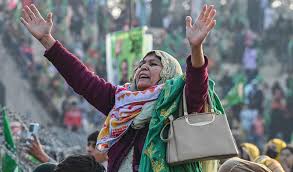By: Hafsa Mehmood
Once I was unable to decipher the reason behind dark-circled eyes, shallow smile and stressful face of parents’ at the most joyous occasion of marrying their daughters. After my exposure to the societal customs; everything seems to be crystal clear. Now I understand the reason behind the fearful faces of marrying offspring’s particularly daughters.
The reason which occupied them throughout their lives and didn’t let them enjoy the moment they longed for. Hundreds of South Asian families have been victimized by this unfair tradition yet you, I and everyone follows it blind-folded.
I tried to find the evaluation of dowry in sub-continent but in vain. At the same time I found that there are two types of dowry exist: mandatory and discretionary dowry. The so-called given logical purpose is to give share to daughter as a blessing for sound future by giving financial support to groom’s family as opposed to forgoing daughter’s right to land inheritance. Despite the literacy rate rising and ethical values declining, the demand for dowry increased from grooms-side.
Real essence of this practice demolished with time when people started molding it and welcoming a way for catastrophic outcomes to be seen in years ahead. According to Islamic history, there is no concept of demanding or giving expensive gifts even as dowry to daughters. Islam encourages simple celebrations with extravagance as merely a choice of either parties.
The question here arises why dowry is still a larger part of Indian and Pakistani weddings. Hinduism being the oldest religion of the subcontinent had dowry as a primary requirement for a bride to qualify for an arranged marriage. Since Hindus and Muslims have mingled for hundreds of years before separating as two nations, these customs became a permanent tradition for the Muslim population as well.
Islamic ethos in any context doesn’t preach for demand of dowry. After the arrival of Islam, Muslims of Indo-Pak subcontinent “Islamized” the concept and called it “jahez”. This comes from the Arabic word ‘tajheez’ which means to prepare someone for a journey. The goods prepared are called ‘jahazun‘. Following these, the Urdu word ‘jahez‘ was coined. The Muslims of the Indo-Pak subcontinent who later converted to Islam continued to follow some of their customary traditions with slight variations i.e. the traditional wedding gifts in the form of cash, gold, furniture and fixtures but without the groom or his family demanding them. Justifying this act, various people quote Islamic historical event when Prophet Mohammad (SAW) presented gifts to his daughter Fatima Zahra (R.A) which by the fact were not pretentious but some household items. The concept of giving gifts to daughters on the occasion of their marriage is still alive, while supporting the groom’s financial status is still used as a justification mainly by those who are pretty much financially stable.
I think most of the families in Pakistani society are affected by this everlasting system. Unfortunately, the practice of mandatory dowry still exists in Punjab and Sindh in Pakistan. This system laid down the status of women in society. Dowry is being exhibited in weddings proudly as a sign of triumph. It is criticized by spectators “Sirf itna saman de k bhejainge beti ko (you will marry your daughter with such few products!)” because in our society a bride’s status and respect is measured by the number of items and cash not only by illiterate but literate families too. So if a girl dies just because her family can’t afford her marriage, believe it or not we as society are responsible equally.
From our Print Edition
















